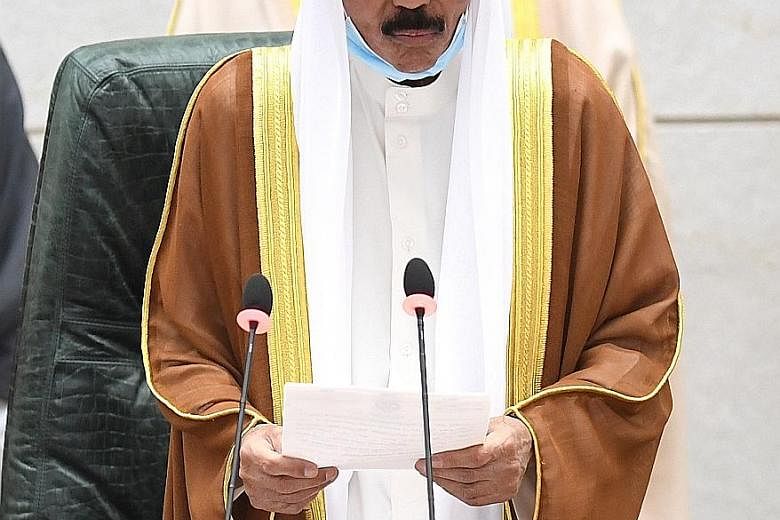KUWAIT CITY • Kuwait's new emir was sworn in yesterday in Parliament as the country prepared to lay to rest late ruler Sheikh Sabah al-Ahmad al-Sabah, who helped steer the US-allied Gulf state through some of the Middle East's most turbulent decades.
The Cabinet swiftly named the designated successor, Crown Prince Sheikh Nawaf al-Ahmad al-Sabah, as ruler on Tuesday following the death of Sheikh Sabah, 91, whose body arrived in Kuwait yesterday from the United States, where he had been hospitalised since July.
Sheikh Nawaf, 83, pledged to work for the Opec (Organisation of Petroleum Exporting Countries) member country's prosperity, stability and security after taking the oath of office, raising both hands to his head as lawmakers applauded.
"Our dear nation today faces difficult situations and dangerous challenges that can only be overcome... by unifying ranks and working hard together," he told the National Assembly.
The funeral has been restricted to members of the ruling family, owing to concerns about the coronavirus which - along with low oil prices - has strained the wealthy petroleum producer's finances. The country has begun a 40-day period of national mourning.
"We honestly feel like we're going to be lost without his guidance," said Ms Fajer, a Kuwaiti woman.
Dignitaries from around the world paid respects to the seasoned diplomat and savvy politician, who was widely respected as a humanitarian who strove to heal rifts in the Middle East, mending ties with former occupier Iraq and trying until his death to resolve a bitter Gulf dispute.
In her condolence letter to Sheikh Nawaf yesterday, President Halimah Yacob said Singapore will always appreciate the longstanding support of Sheikh Sabah with regard to the bilateral relationship between the two countries.
"His Highness remained a strong believer of cooperation among small states such as Kuwait and Singapore for mutual benefit," said the President, adding that she recalled his "enduring optimism" for preserving regional stability.
Analysts saw Sheikh Sabah's death - following that earlier this year of Oman's Sultan Qaboos, who also played a moderating and balancing role in the region - as the end of an era in the Gulf.
An aggressive younger generation has risen to power, particularly in Saudi Arabia and the United Arab Emirates, which have taken hawkish stands against rival Iran.
"Though the incoming power brokers in neighbouring Gulf countries did not always heed his advice, the Emir was a reminder of an order hard-fought to achieve that was the basis for the goodwill international partners bear the region," wrote Ms Kirsten Fontenrose, director of the Atlantic Council's Scowcroft Middle East Security Initiative.
Sheikh Nawaf, who has held high office for decades, takes over as Kuwait is facing the repercussions of the coronavirus crisis, which has triggered a sharp decline in oil prices and severe economic consequences for Gulf states.
The elder statesman, who was named heir apparent in 2006, served as defence minister when Iraqi troops rolled into the oil-rich emirate in 1990, and also as interior minister in the face of challenges from Islamist militants.
The new leader is popular within the ruling al-Sabah family and is reported to have been a consensus choice for ruler.
He also enjoys a reputation for modesty and has largely maintained a low profile.
Kuwait's oil, investment and foreign policies are not expected to change under his rule.
Despite expectations for a smooth succession, there could be more spirited debate over who the new crown prince should be. Kuwait's Constitution stipulates that the ruler should be a descendant of the nation's founder Mubarak al-Sabah, but the throne has alternated between the descendants of his sons, Salem and Jaber, for four decades.
Contestants for the newly vacated role of crown prince include Sheikh Sabah's son and former deputy prime minister Nasser Sabah al-Ahmad al-Sabah, a Kuwaiti political heavyweight.
REUTERS, AGENCE FRANCE-PRESSE

